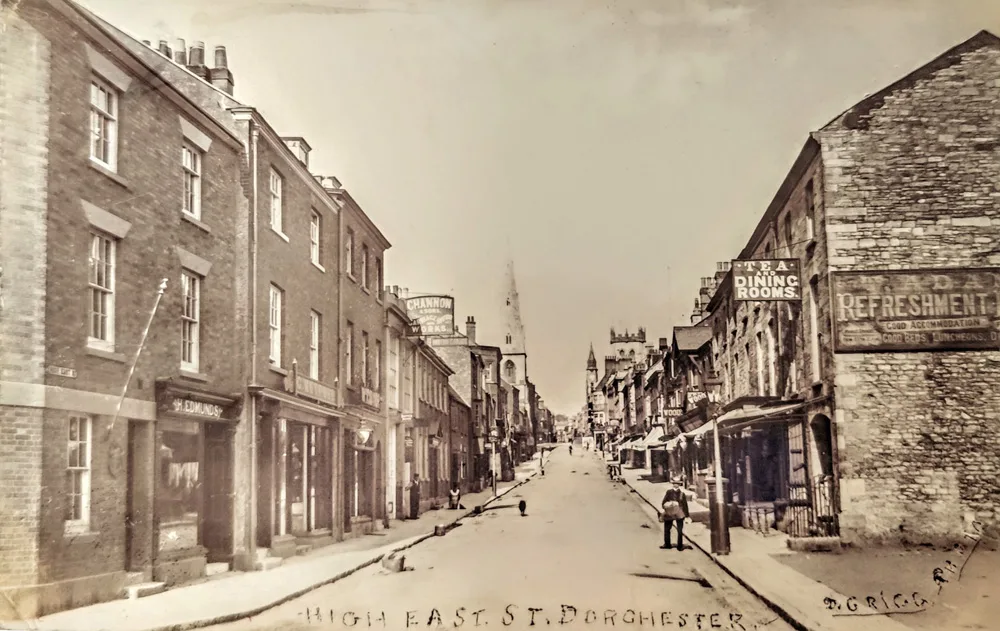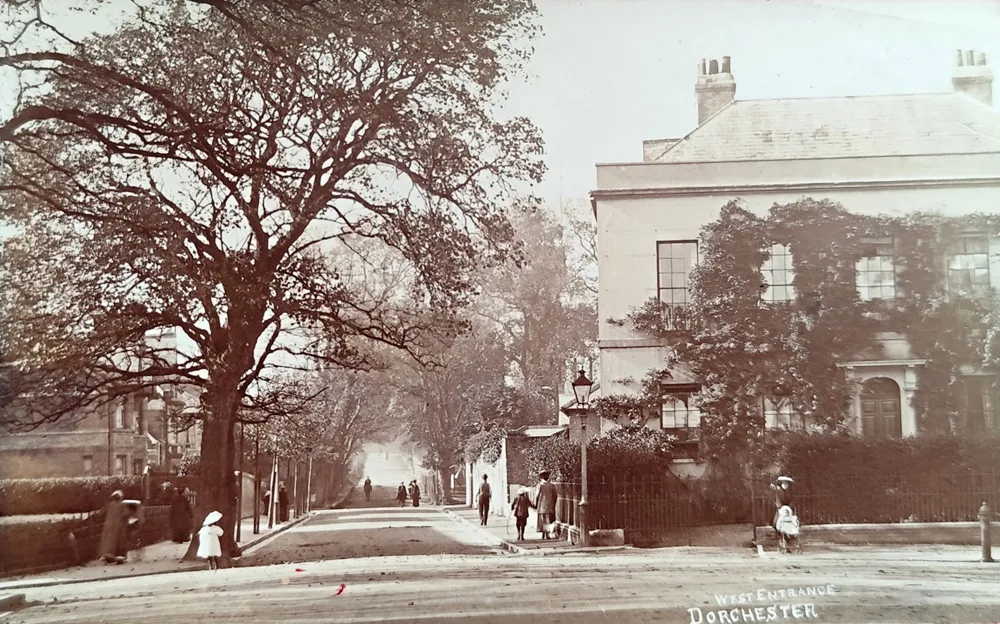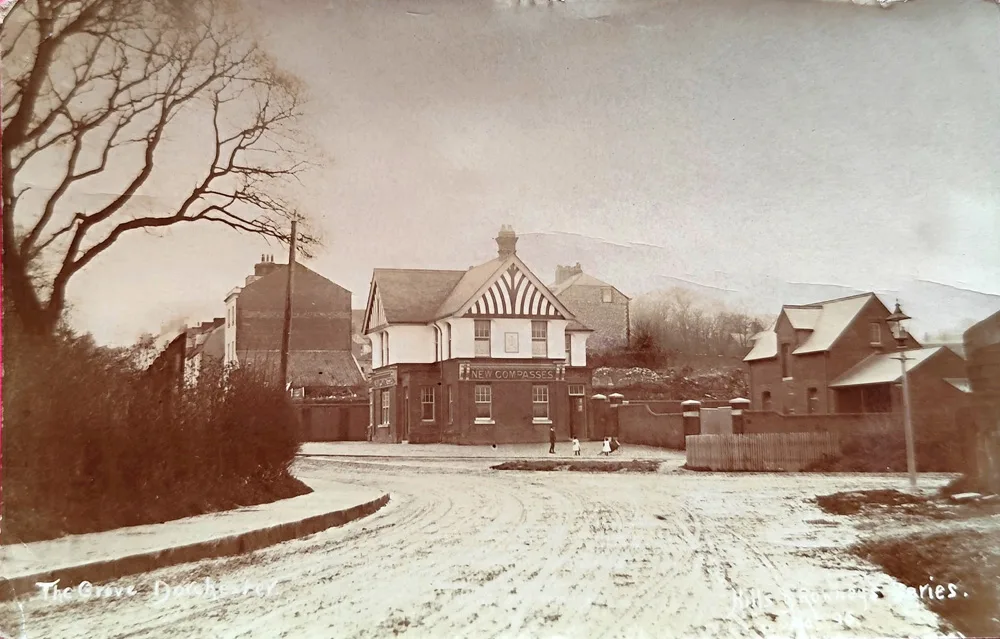A ROMANTIC STORY – EXTRAORDINARY DISCLAIMER FROM COMTE DE VERE.
Southern Times and Dorset County Herald – Saturday 19 October 1901

We have received from a London address a lengthy letter signed “De Vere” explanatory of the romantic episode which occurred under the shadow of Holy Trinity Church a week or two ago, and which caused such a lively sensation in that quarter of the town. The Comte states the story is absolutely false and is devoid of a vestige of truth, and he calls for a withdrawal. He then proceeds to give the facts, and the frankness with which the story is told is so characteristically “Continental” that we give it ‘verb et lit’ expunging only portions which, while not bearing on the story, are too strongly spiced for English ears, and also excising redundant abuse of the individuals who disturbed his domestic peace: –
‘The lady you refer to as Lily is my wife – ‘morganatic’*, of course, but legally my wife. She could now produce the contracts. I need not draw comparisons between the loved, honoured though romantic wife of a foreign nobleman and the mistress of a parvenu nobleman of the present English type. The contemptible cowards who came to Dorchester were not what you describe them, and there was no solicitor there. When they arrived I was partly undressed. I was then unarmed. I shouted for someone to go for the police, but no one heard me. If it were now there would be a different tale to tell, I only wish they would return.

‘Now’ images by Courtenay Hitchcock
They broke open the flimsy door, and one person immediately rushed at me, bayonet fashion, and thrust a stick into my abdomen. He was a man of 16 or 17 stone weight. I am not ten stone
I forget what happened after that. Were it now I would shoot the lot, much as I would shoot rats, and I am now, I may say, armed with one of the most beautiful, expensive, and effective weapons known, and am an expert shot – quite what is termed a “fancy shot.” The revolver I then had (a Smith & Wesson) was broken. I had no cartridges, and it was locked away. I had actually ordered a new one that day, and the catalogue arrived by post the following (Sunday) morning.
I may say that the “brother” you refer to is only a half-brother, and practically (legally) no relative. The lady is of full age.
There was no “elopement,” no “abduction” on my part. On Monday, September 30th, I received the lady back (under police protection). The instant she was free she wired me.

Warrants had been applied for (and were granted), and had the lady not returned here on Monday the warrants would have been executed on Tuesday. I may say the police at Dorchester were hoaxed. The men who came to Dorchester told the lady that warrants were in the hands of Supt. Plummer for my arrest on a serious charge, &c. They also told the police that I had abducted the lady. On Saturday, the 21st ult., as soon as I could do so, I sent the lady all her belongings, together with £20 in money in order to enable her to get help and escape. I wrote over 20 letters; up till to-day (October 11th) she has not received either the money or letters, but I understand all have now been returned to the Postmaster General and that we shall have them all in due course. Her trunk was broken open and ransacked, and two parcels were opened and two letters extracted. I gave the lady my word of honour I would not prosecute. I have kept my word. Should my friends ever get hold of the “brother” (out of England) I, of course, do not know what they may do. I immediately circulated his full description abroad, also that of the lady. Had they left England there would have been no further trouble. I was seriously ill for several days (owing to stick thrust), and quite unfit to decide on a proper course of action. Hence the reason why the Lady was allowed to be kept in durance for ten days. I had quite an army of friends here prepared to adopt lynch law, but I restrained them. Finally, my wife was as anxious about her partner as I was (they are really more than sisters), and blamed me for not adopting drastic measures. In the end I allowed my solicitor to act for me.

When the Lady arrived in London she was in a very nervous state, and had evidently suffered much. However, it could never happen again. It is the first time in my life I was ever unarmed; it is the last. It was a dastardly outrage. No Englishmen worthy of the race would have acted as those “men” did. How I do wish they would come back now!

As to the house (or labourer’s cottage) at “Trinity Church,” she rented it without seeing it. She thought it was a vicarage at least. As for my leaving Dorchester, I had regretted leaving before I was well out of the station. I only left in order to follow up and take action. Now I find that a wire to Scotland Yard, London, was all that was necessary. The party would then have been detained in London and sent back, and a vast amount of trouble and expense would have been saved. I am informed that it cost the “brother” over £200. Had he gone to a solicitor he could have had it all for 6s. 8d., or had he gone to Scotland Yard he could have had advice gratis.

And now, just as a finish, I may tell you, as a fact, I know beyond all doubt that the whole affair was at the instigation of a woman (of very low mental calibre). – simply a little revenge for imaginary slights &c. You see, sir, that one side of a tale holds good until the other side is heard. As to myself, my position, my family, my actions, &c., all are above reproach and beyond question. There is not a single act of my life to which I would or could object having made public. All the same, I do not court notoriety, and only wish to be left severely alone. I am just leaving England for the winter. – Yours sincerely, DE VERE.’
The Comte encloses his card. The story as it is told makes more like a page from a penny “shocker” than an incident of real life. Comte de Vere is welcome to any relief that his own candid revelation of the real facts as his Dorchester adventure can afford him. It shows at any rate that the incident as we related it was not too highly coloured. With regard to the moralities of the case perhaps the least said the better. Comte de Vere was certainly not fortunate in the selection of the place for his curious ménage, and Dorchester is well rid of him and his companions. It is an unsavoury story at the best, and the Comte would be well advised to keep himself and his Oriental household on the other side of the Channel.
A morganatic wife refers to a woman married to a man of royal or noble rank, whose children from the marriage are not entitled to his titles or privileges.
Editor’s note: Having found the fascinating rebuttal, we naturally had to track down the original … so here’s the article the Comte was responding to:
A ROMANTIC STORY – AN ELOPEMENT AND ITS SEQUEL
-A romance of real life – what the compatriots of the “Count de Vere” would call a roman vicu – has come to light in the quiet and decorous town of Dorchester. Its dénouement on Saturday afternoon caused quite a flutter in the dovecotes of propriety, and drew a large crowd of the curious to the scene of the drama, that secluded eddy of calmness off the bustle and noise of the High Street, Trinity Cottages. Here, at Number 3, to be precise, in the quiet corner house which gives a certain air of distinction from its conservatory, and faces the pleasant greensward formerly occupied by the “Cold ‘hid jackets’ of the dead,” this rosy romance has been hatching itself during the last three weeks. Three weeks ago a gentleman and two ladies took up their abode in this most modest, most quiet, and most respectable domicile. The gentleman was no ordinary specimen of humanity, no piece of common clay. Romantic blood ran in his veins, according to his own statement, French or Spanish, or, as some say, a little of both. About five feet seven in height, of pre-possessing appearance with light curly hair and well-trimmed moustache, affecting a light suit and a “Trilby” hat – such was the “Count de Vere,” as he announced his name to be. Of his lady companions one cannot speak so positively. Both were undeniably comely. His wife – we should say the Countess de Vere – was of about his own age, good-looking, and suggestive of the lsle of Erin*. The second lady was a pretty blonde. Of her relations to the “Count” it is impossible to say. Rumour spoke of an elopement, and of her making the acquaintance of the Count while she was engaged as a telegraphist in a London telegraph office.
Whatever degree of truth there may have been in these rumours, certainly they received corroboration from the sensational events of Saturday. A mysterious party of five individuals made their way to the quiet little house on Saturay afternoon about half-past three.

Image courtesy of Symonds & Sampson
One was the lady’s brother, another the lady’s sister, a third a solicitor from London, also having a branch office in Paris, at the Rue Tronchet. The fourth was the solicitor’s clerk, and the fifth a useful, a possibly very useful, though somewhat nondescript character, whom for the sake of convenience we may describe as a “chucker-out” or handy man.
“I am come for you, Lily.” the brother cried as he entered the house.
The young lady beat a hasty retreat upstairs and rushed into a room and locked the door in the face of the party. Where persuasion fails force is often a useful thing; and the indignant brother quickly broke open the door, to find the “Count” in the room as well as his sister. An excited and angry scene followed. And there must by this time have been about 200 people gathered outside the house. But law and the logie of the strong arm prevailed.
A ‘bus was chartered, and drove up Colliton Street from the King’s Arms Hotel. A box, presumably containing the gay young lady’s goods and chattels, was carried forth and deposited in the orthodox manner on top of the ‘bus; and then the damsel berself, looking not a little forlorn and woe-begone, was escorted out between her brother and sister, the “handy man” within prudent distance. All drove off to the South Western station in time to catch the 5:45 express for London. On Monday there was more house-shifting in connection with this drama “taken from real life.” About ten o’clock a ‘bus was loaded with boxes by Trinity church, and the remainder of the birds-of-passage left for the railway station.
Thus the curtain dropped on the performance, at least as far as Dorchester is concerned.
*Trinity Cottages sits off Grey School Passage, just behind Holy Trinity Catholic Church
**Ireland


